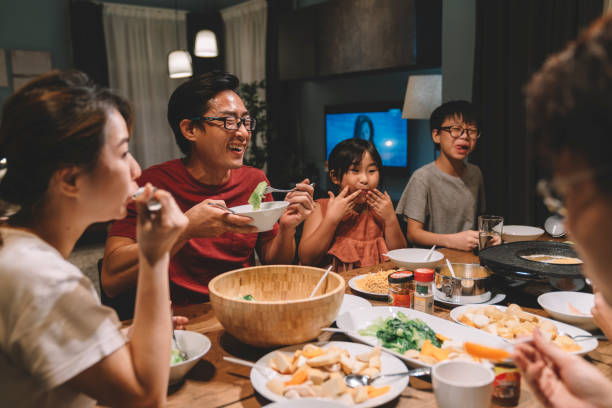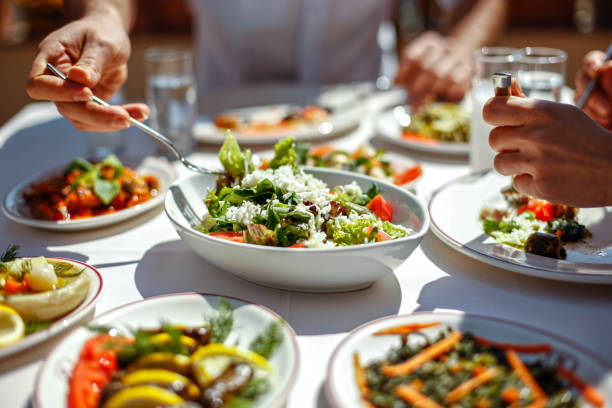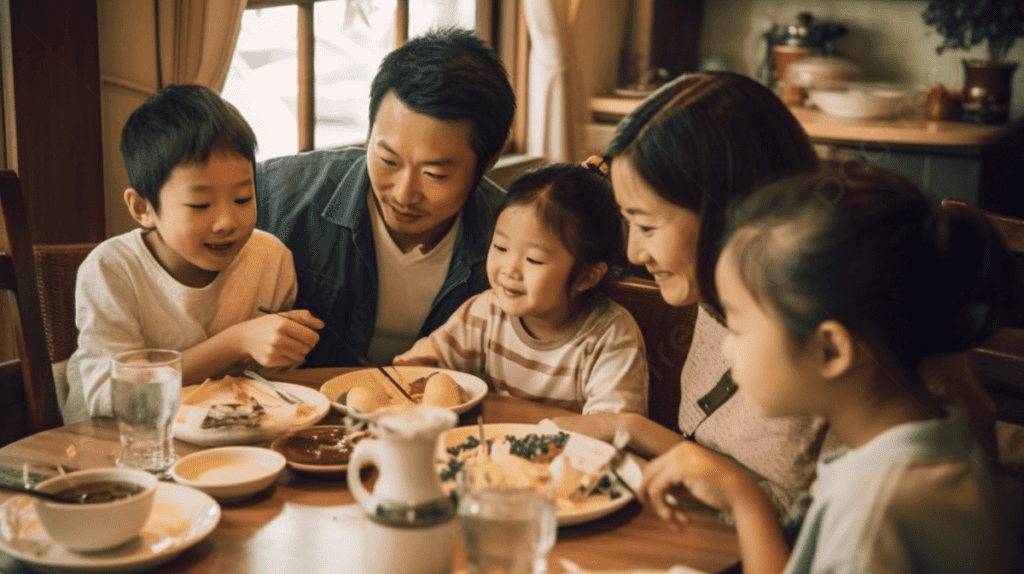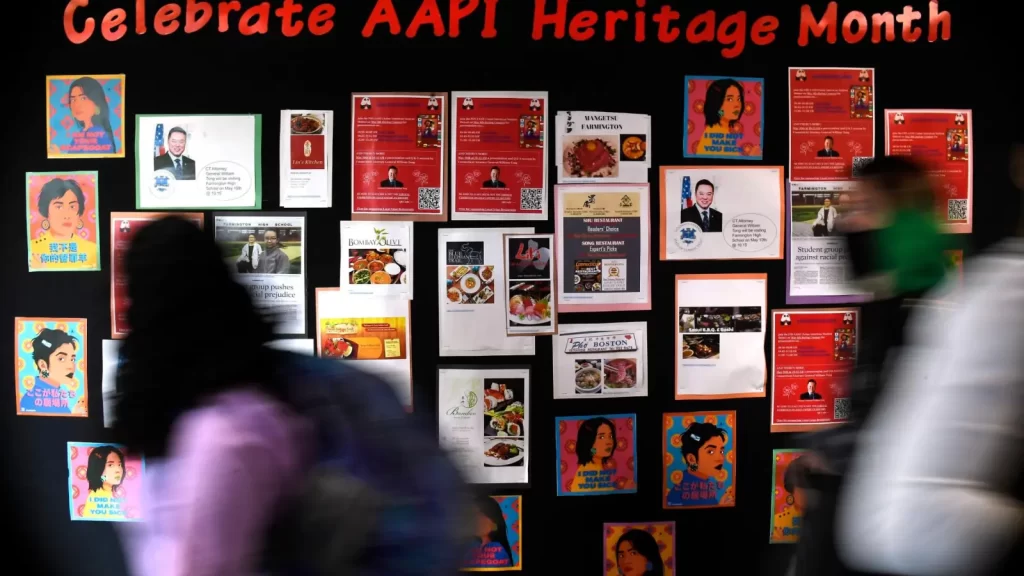Growing up, family dinners were as routine as brushing your teeth.
I remember the smell of my mom’s cooking wafting up the stairs, the familiar clang of pots and pans telling me it was time to set the table.
As we all sat down, the room filled with voices, laughter, and the warmth of being together.
Those times weren’t just about having a meal—they were a chance for us to bond, share, and grow as a family.
Now, living on my own and making my own meals, I understand the true value of holding onto this tradition. In Asian American homes, especially, these meals carry layers of cultural meaning and offer a special way to stay connected.

Creating a Sense of Belonging During a Meal
Family dinners offer a consistent and predictable structure that is crucial for children. This regularity fosters a sense of security and belonging.
In Asian American households, cultural traditions and values play a significant role. Dinnertime becomes more than just a meal; it’s a chance to:
- Share stories about our heritage.
- Discuss family history.
- Speak our native languages.
These practices help our children connect to their roots and understand their cultural identity.

Imagine a dinner where we discuss our family’s journey, recount old family stories, or use our native language. These moments are invaluable in helping children appreciate and understand their cultural background.
Cultural stories and traditions often come to life around the table.
For instance, sharing family stories or the history behind certain dishes can turn dinner into something much deeper than just a meal. It’s about creating a sense of belonging and passing down culture through each shared experience.
These moments do more than fill us up physically; they nourish our connection to each other and to our roots.
Enhancing Communication Skills Through Traditional Means
Dinner is also a perfect chance for kids to naturally grow their communication skills by being part of family conversations. It’s their chance to:
- Express their thoughts.
- Share their experiences.
- Learn to listen.
In Asian American families, where language differences or unique cultural norms may be present, family mealtime conversations hold special importance. Encouraging kids to share their thoughts openly and respectfully can help close any cultural or generational divides. It’s about making a space where everyone feels valued and heard.
Family meals are also a chance to develop skills like active listening and respectful conversation.
Through everyday discussions, we can show children how to listen thoughtfully and express themselves clearly.
These are skills that will serve them well, both in school and in their social lives.
Promoting Healthy Eating Habits
Eating together as a family can significantly promote healthier eating habits. Here’s how:
- Serving balanced meals models good eating behaviors.
- Involving kids in meal preparation exposes them to a variety of foods.
To help your kids understand the importance of eating well, actually get them involved in cooking.
This encourages a positive view of healthy food.
Trying new foods is always fun for kids as well. Let them discover different flavors from different ingredients and ponder where they come from.
For instance, making dumplings is extremely difficult but very rewarding in terms of enjoyment and tradition.
This approach helps kids develop a taste for a variety of flavors and learn the importance of balanced eating.

Teaching Life Skills at the Table
Dinnertime is also a perfect opportunity to teach valuable life skills. From:
- Setting the table.
- Helping with cooking.
- Cleaning up.
Children learn responsibility and teamwork through these tasks.

Though these might seem like basic tasks, they play a big role in building a child’s confidence and sense of accomplishment. Many Asian American parents use traditional recipes and cooking methods as a way to share cultural knowledge and culinary skills.
By including kids in meal prep, they pick up essential life skills like reading a recipe, measuring ingredients, and managing time.
These abilities go beyond practicality—they give children a sense of contribution and achievement. They come to understand that everyone in the family has a part in creating an enjoyable and meaningful mealtime experience.
Building Stronger Family Bonds by Spending Time Together
According to the American College of Pediatricians, “Family meals are powerful for many reasons. First, mealtimes impact all of our senses – the sight, touch, taste, and smell of food, as well as listening to family conversation. Family meals offer the opportunity to spend time together, reconnect after a busy day, communicate with and listen to each other, share values and ideas, and problem solve.”
At their core, family dinners are about fostering close family bonds. In the busyness of everyday life, it’s easy to feel disconnected. Sitting down for a shared meal gives families the opportunity to:
- Reconnect.
- Strengthen their relationships.
For many Asian American families juggling cultural expectations and identity, these moments of connection are essential. They create a space where family members can offer support and strengthen their bonds.
Sitting down for dinner also lays the groundwork for working through challenges and sharing life’s ups and downs.
In fact, as of September 2022, 91% of parents surveyed noticed their family was less stressed when they shared family meals together.
Talking about the day’s events opens doors for discussing problems and brainstorming solutions as a family. It becomes a time for encouragement, advice, and mutual support.
Navigating Challenges with Busy Schedules
Keeping up with regular family dinners isn’t always easy, especially when schedules are packed. Here are some ways to make it manageable:
- Prioritize family meals, even if it’s just a few nights a week.
- Be flexible and creative.
- Consider alternatives like a picnic, a brunch, or a shared dessert after dinner.
The key is to make family meals a priority and find a routine that works for your family. It’s not about perfection but about making the effort to stay connected despite the chaos of daily life.
Planning meals can help, too. Preparing dishes ahead of time or sticking to simple recipes makes it easier to get everyone together.
Batch cooking or having ready-made options on hand can save time and make sitting down together a little easier.
Food for Thought
Whenever I have a bad day, I think back to times spent around the dinner table with my family.
Those memories really do fill me up with so much warmth.
Now, of course, I love and miss my mom’s cooking, but those dinners weren’t really about the food. They were really the time when I spent the most time talking and connecting with my parents in an environment where I felt totally at ease.
There’s something special about how food brings people together. Family dinners create those moments where stories get shared, traditions stay alive, and bonds grow stronger.
It’s also a time for kids to learn, feel seen, and understand what it means to truly belong.
So let’s keep treasuring these moments, making room for family dinners as a time to celebrate life together. They’re not just about the food but about sharing life, learning from each other, and creating a future built on love and understanding.









